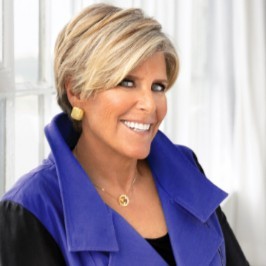Longtime financial expert, Emmy-award winning television host and author Suze Orman says she was semi-retired when she got a pitch that inspired her: an employer-sponsored emergency fund.
It was an especially exciting idea as Orman has been a proponent of emergency savings for years—and because she witnessed the financial toll COVID-19 took, wreaking havoc on employees’ financial situations.
“I watched the pandemic financially change people’s lives in a way that they never thought was possible,” she said last week during HRE’s HR Tech Virtual Conference. “What happened to them? They didn’t have emergency savings.”
Emergency savings, generally speaking, have been sorely lacking: Statistics show that 40% of Americans couldn’t afford a $400 unexpected expense; about two-thirds of Americans lived paycheck to paycheck; and “short-term money matters” were the top source of stress for Americans. And those statistics were from before the pandemic.
COVID-19 made financial matters worse as health issues and job security took their toll on many Americans, while others lost jobs, had to miss work because of COVID infections or saw their investments and 401(k) balances take significant tumbles. Many financially stressed employees took out loans on their 401(k)s as well.

Those issues left room for a benefit that specifically targets helping employees start and pad their emergency savings accounts—which is why in 2020 Orman, with Devin Miller, started SecureSave, an emergency savings fintech platform that allows employees to automatically sock away savings from their pay. With the platform, employers are able to match employee contributions if they wish. Those who have implemented the benefit see up to 60% adoption by their employees, said Miller, SecureSave CEO and co-founder.
“[People] will not just take money and put it in an emergency fund,” Orman said. “When it’s done automatically for you through your paycheck and your employer matches it, now we’re talking. This is the most exciting, important and needed employee benefit that has ever been offered in the history of employee plans.”
Orman and Miller will be speaking about the financial state of employees, the trend of emergency savings programs and how they work April 6 during HRE’s Health & Benefits Leadership Conference in Las Vegas. (Register for the event here.)
“The whole concept behind this is just to build and maintain the habit of savings for employees,” said Miller. “The reason employers are doing this is because they understand the importance of getting employees to have better savings habits and be better prepared for unexpected things.”
It’s no wonder why employees are behind the idea, Orman said. “Not only is it automated, but they can take it out whenever they want and they don’t have to pay taxes on it,” she said. “It’s all accessible to them, including the employer match. There’s no fear of doing it; if they need it, they can get it.”
Emergency savings programs are one of company leaders’ biggest benefits opportunities, Timothy Flacke, executive director and co-founder at Commonwealth, a Boston-based financial nonprofit, recently told HRE.
Related: Biggest financial health opportunity? Focusing on short-term help
“For very understandable and good reasons, in a workplace context, a lot of our focus on benefits is really on long-term financial security. But the thing that we sort of missed at a high level is that, for the majority of workers in this country, their financial life is very much in the present,” said Flacke, who will go in-depth about financial health opportunities on April 5 at the Health & Benefits Leadership Conference.
“From our perspective, that creates real opportunity,” Flacke said. “[Emergency savings] have not been talked about as a workplace issue. And today, we feel like that’s very different. There really has been a shift that this is now a workplace-relevant issue.”
The post The ‘most needed employee benefit,’ according to financial guru Suze Orman appeared first on HR Executive.